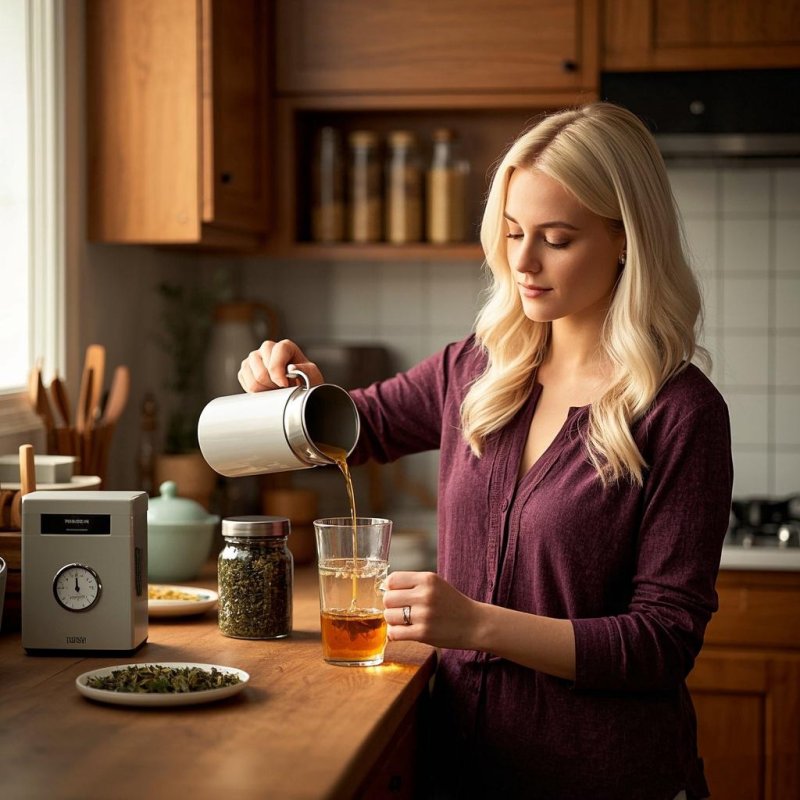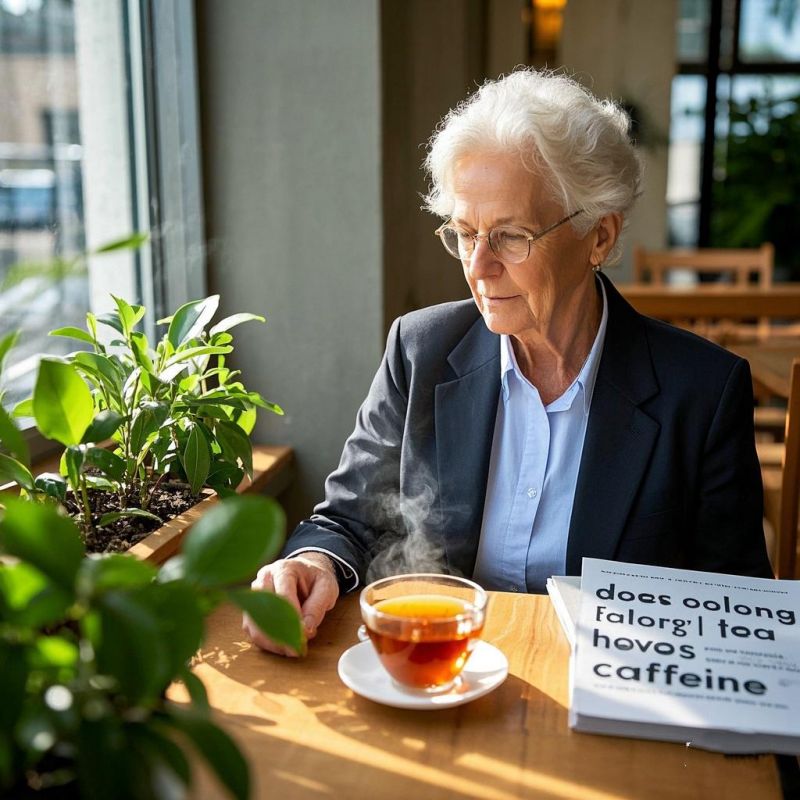I sat down with nutrition expert Sarah Kim in a light-filled café, her tea tray quietly buzzing with steam, and asked: “So — does oolong tea have caffeine?” She smiled, took a thoughtful sip of her amber brew, and said: “Yes — and the amount matters more than you might think.”

There it was: the question that so many people ask when they reach for that rolled, aromatic cup of Oolong tea. Does oolong tea have caffeine? In everyday terms, does it give a lift like coffee or shake you awake like an energy drink? And how much caffeine are we really talking — the “oolong tea caffeine mg” question in full.
Over our conversation, Sarah broke things down with a mix of data, practical tips, and yes, some playful questions. “If a cup of coffee hits you like a wave, how should a cup of oolong feel?” she asked. We found that yes — oolong tea does have caffeine, typically in the range of approximately 30-50 mg per 8-ounce cup, though the real figure depends on myriad factors. (Red Rose Tea)
Let’s walk through the story — the numbers, the nuance, the “why does it feel different” — in the same friendly, conversational way Sarah and I talked it out. Because you don’t just want to know does oolong tea have caffeine — you want to know what it means for you.
H2: What Exactly Is Oolong Tea and How It Compares
To set the scene: oolong tea comes from the same plant as green and black teas — Camellia sinensis. The difference: processing. It is partially oxidized, meaning it sits between fresh green teas and fully oxidized black teas in flavour and chemical profile. (今日医学新闻)
Sarah leaned in and said: “If green tea is sprinting and black tea is a marathon runner, oolong is the jogger who still wants to smile.” One key takeaway: because of that middle ground processing, the “caffeine question” takes on extra twists.
Here’s how oolong stacks up in caffeine terms:
- On average, one 8 oz (≈240 ml) cup of oolong contains about 10 to 60 mg of caffeine. (今日医学新闻)
- More commonly, estimates centre around the 30-50 mg range for a typical brew. (Danfe Tea)
- For comparison: an 8 oz cup of coffee often contains ~95-100 mg or more.
So yes, when someone asks “has oolong tea got caffeine?”, the answer is yes — but less than many people expect if their frame of reference is coffee. Sarah emphasised: “That’s the nuance — moderate caffeine, but enough that it matters.”
H2: The Numbers & What They Mean — “oolong tea caffeine mg” In Context
Now let’s look at how the numbers play out, the “oomph” you feel, and why it’s not simply a fixed number.
The data snapshot
According to one source: “Tea (Oolong) … contains 37 mg of caffeine in an 8 fl oz cup” (≈240 ml) as an average. (caffeineinformer.com)
Other sources say: 30-50 mg per 8 oz. (Danfe Tea)
Some breakdowns:
- High Mountain Oolong: ~42-68 mg caffeine per 5 g of tea. (jteainternational.com)
- Lower end varieties: ~16.6 mg in some very lightly processed oolongs. (caffeineinformer.com)
Why there’s variation
Sarah pointed out multiple influencing factors:
- Leaf grade and how mature the leaves were when picked
- Oxidation level and roll/twist of leaves (many oolongs are tightly rolled)
- Amount of leaf used and brewing time/temperature
- Number of infusions (many oolong drinkers steep the leaves multiple times)
In her words: “Each infusion is a layer of caffeine release — so if you steep five times, you get five waves.”
Tea-making sources confirm brewing method matters—longer steep, higher temp, more leaves = more caffeine. (The Spruce Eats)
What you might feel
Because the caffeine in tea releases alongside other compounds (like L-theanine), many people feel a smoother lift: more focus, less jitter. Red Rose Tea’s guide says: “Oolong tea generally has less caffeine than black tea, but more than green tea.” (Red Rose Tea)
Sarah said: “If coffee is a sprint, oolong is a sustained foot-race. You get a lift, but less crash.”
Practical takeaway
If you’re comparing:
- One cup of oolong (~30-50 mg caffeine) ≈ ~⅓ to ½ the caffeine of a standard coffee cup (~95–100 mg)
- If you’re sensitive to caffeine, even single digit tens of milligrams matter
- If you’re looking to replace coffee with tea: you might need two cups of oolong to hit a similar caffeine level to one coffee — but you’ll get a different effect.
H2: Brewing & Choosing Oolong — How to Manage the Caffeine
So we know does oolong tea have caffeine → yes. But how to control it? Sarah walked me through how to pick and brew so that your cup works for you.
Choosing your leaf
- Opt for whole-leaf oolong rather than broken tea bags. Whole leaves often give more consistent flavour and predictable caffeine.
- Know the oxidation level: lighter oolongs (lower oxidation) often have slightly less caffeine; darker, roasted oolongs may edge higher.
- Pay attention to region and grade: some Taiwanese high-mountain oolongs show higher measured caffeine (e.g., 42-68 mg in 5g leaf) in tests. (jteainternational.com)
Brewing for your desired lift
Sarah said: “If you’re after the morning pick-me-up, brew hot and strong. If you just want mid-afternoon calm focus, brew lighter.”
- Standard brew: 1 teaspoon (~2g tea) in 8 oz water for 3–5 minutes → yields around ~30-50 mg caffeine typical.
- Shorter steep (e.g., 1–2 minutes) and cooler water → lower caffeine release.
- Multiple infusions: each successive brew releases caffeine less aggressively, but cumulatively adds up.
- How you drink matters: sipping throughout the day will spread the caffeine effect out.
Timing & daily intake
- Because caffeine is moderate, many find oolong suitable later in the day compared to coffee, but caution if you’re highly sensitive.
- The FDA suggests healthy adults cap caffeine at around 400 mg per day. Using that benchmark, you’d need ~8 to 10 cups of oolong to approach that. (Health)
- Sarah recommends: if you drink late in the day, go lighter on steep or choose an earlier infusion.
If you want lower caffeine
- Brew a “blink” infusion (30 seconds) and discard first steep, then use second infusion. Some caffeine is released immediately upon contact with hot water.
- Choose lightly oxidized oolong or one explicitly labelled “low-caffeine”.
- Pair with food: Having your cup alongside a meal may moderate the caffeine effect.
H2: Health Effects & What Caffeine in Oolong Means for You
Now we get to the “why care” part: You ask “does oolong tea have caffeine” and we answer “yes” — but what does that mean for your health?
Benefits

According to Medical News Today, oolong often contains 10–60 mg of caffeine per 8 oz, and that moderate caffeine + other compounds may contribute to benefits like heart-health support and weight management. (今日医学新闻)
For example, studies found:
- People drinking oolong had lower total cholesterol, triglyceride and LDL levels compared to non-drinkers in Chinese research. (今日医学新闻)
- Effects on weight: in mice fed high-fat diets, oolong extract reduced abdominal fat gain. (今日医学新闻)
The caffeine contribution
Moderate caffeine yields benefits without the high-spike risks:
- Improved alertness, mild metabolic boost
- When combined with L-theanine (in tea) you may get clearer focus, less jitter.
But caffeine also carries considerations.
Risks & considerations
- If you are sensitive to caffeine, even ~30–50 mg can cause jitteriness, sleep disruption. Verywell Health states oolong tea contains about 30-50 mg caffeine per cup and may cause side-effects in sensitive people. (Verywell Health)
- Caffeine can interfere with iron absorption if consumed with meals — oolong is no exception. (今日医学新闻)
- Overconsumption: While typical use is safe, consuming large amounts of any caffeinated beverage repeatedly might stress sleep or heart rate.
What Sarah advised
“Treat your oolong cup like a tool, not a crutch,” she said. “Use the caffeine tilt to your day- rhythm — not let it drive your day for you.”
In practice:
- Use it as a mid-morning or afternoon reset rather than late-night stimulant
- Combine with good sleep, hydration, mindful eating
- Recognise the caffeine effect as one piece of the wellness puzzle
FAQ: Key Questions About “What is Oolong Tea” and Related Topics
Here are some of the most common questions people ask — simplified and direct.
Q1. What is oolong tea exactly?
A: Oolong is a traditional tea from the Camellia sinensis plant that falls between green and black tea in terms of oxidation and taste. Because it’s partially oxidised, it takes characteristics of both fresh and more robust teas.
Q2. How much caffeine does oolong tea typically contain?
A: Most sources list around 30-50 mg caffeine per 8 oz (≈240 ml) cup, though experiments show ranges from ~10 mg to ~60 mg depending on leaf, brew, infusion number.
Q3. Is oolong tea better than green or black tea because of its caffeine level?
A: “Better” depends on your goal. Oolong offers a moderate caffeine boost (greater than many green teas but less than many black teas/coffee) and a flavour/oxidation profile many enjoy. If you want mild lift + rich flavour, oolong may be ideal.
Q4. Could oolong tea replace coffee if I want caffeine but less crash?
A: Possibly yes. Sarah said: “If coffee is a sprint, oolong is a sustained jog.” With ~30-50 mg caffeine per cup, you’ll need more volume than one coffee cup to match coffee’s ~95 mg, but you often get steadier energy and fewer jittery side-effects.
Q5. How should I brew oolong tea if I’m concerned about caffeine?
A: Use shorter steep, cooler water, fewer leaves—or choose earlier infusion rather than later in the day. Also avoid drinking right before bed if you’re caffeine-sensitive.
Final Thoughts
So when you ask “does oolong tea have caffeine?”, you’re hearing a simple answer with layers underneath. Yes, it does — and the amount is moderate, variable, and meaningful. As Sarah put it: “Your oolong cup is a signal: energy, yes — but calm, yes too.”
If you’re reaching for a tea that gives you focus without the crash, flavour without over-stimulation, consider oolong. Brew it with intention. Notice how your body responds. Use the caffeine content—those ~30-50 mg—to your advantage rather than as a mystery.
Because in the end, the number is just a number. What’s more important: how the tea fits into your day, your rhythm, your wellbeing. And in that sense, oolong tea caffeine level isn’t just a fact — it’s an opportunity.
